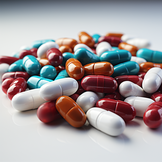Causes, symptoms, and treatment of erectile dysfunction in men.
- Understanding Erectile Dysfunction (ED)
- Identifying Symptoms of ED
- Treatment Options for ED
- Addressing Physical Causes
- Medication
- Surgery
- Lifestyle Changes
- Addressing Psychological Causes
- Therapy
- Medication
- Lifestyle Changes
- Understanding Physical Causes of ED
- Prevalence of ED: Statistics and Predictions
- Psychological Causes of ED
- Importance of Open Communication and Seeking Treatment
- Preventing ED
- Treating ED in the Elderly

Understanding Erectile Dysfunction (ED)
Erectile dysfunction (ED), also known as impotence, is a common but often misunderstood condition that affects many men worldwide. It is characterized by difficulty achieving or maintaining an erection adequate for sexual intercourse.
Identifying Symptoms of ED
ED can present itself in several ways. Some men may find they can't achieve an erection at all, while others might struggle to maintain an erection. Difficulty with erections might also occur inconsistently, with good sexual function on some occasions but not others.
Treatment Options for ED
Managing and treating ED can involve multiple strategies, depending on the cause of the condition.
Addressing Physical Causes
For many men, the root of ED is physical, often tied to conditions such as vascular disease, nerve damage, hormonal imbalances, or the side effects of certain medications. When this is the case, medical interventions are usually required.
Medication
One of the most common treatments for ED is medication. These drugs work by enhancing the effects of nitric oxide, a natural chemical that the body produces to relax muscles in the penis, increase blood flow, and stimulate an erection.
Surgery
In some cases, when medication is ineffective or if there are more complex underlying health issues, surgery may be necessary. Procedures can range from vascular reconstruction to implantation of penile prostheses.
Lifestyle Changes
Certain lifestyle changes can also significantly impact ED.
Quitting smoking, losing weight, and regular exercising can help improve cardiovascular health, which is closely linked to erectile function.
Addressing Psychological Causes
Sometimes, the issue lies not in the body but in the mind. Conditions like depression, anxiety, stress, and relationship problems can all lead to ED.
Therapy
Psychotherapy can be an effective tool in managing ED when it's rooted in psychological causes. Therapists can help patients address and resolve issues that may be causing stress and anxiety, thus improving erectile function.
Medication
Antidepressants, anti-anxiety drugs, or other prescribed medications can be helpful in treating psychological causes of ED.
Lifestyle Changes
Just as with physical causes, lifestyle adjustments can significantly help in addressing psychological causes of ED. Stress reduction techniques and open communication with a partner can foster a healthier sexual relationship.
Understanding Physical Causes of ED
Physical factors play a substantial role in many cases of ED. Conditions like vascular disease can reduce blood flow to the penis, making it harder to achieve an erection. Nerve damage, often resulting from conditions like diabetes or neurological diseases, can also lead to ED. Hormonal imbalances, including low testosterone levels, can affect sexual desire and cause ED. Additionally, certain medications can have side effects that cause erectile dysfunction.
Prevalence of ED: Statistics and Predictions
According to the Massachusetts Male Aging Study, it is estimated that 52 percent of men experience some form of ED. Globally, ED affected approximately 152 million men in 1995, and this number is projected to rise to 322 million by 2025.
Psychological Causes of ED
While physical causes are often at the root of ED, psychological factors can also significantly contribute to the condition. Depression and anxiety can lead to ED, as they can cause both a lack of interest in sex and difficulties achieving an erection. Stress, whether related to work, financial worries, or personal issues, can also lead to ED. Lastly, relationship problems can create a cycle of anxiety and failure that can perpetuate ED.
Importance of Open Communication and Seeking Treatment
Given the potential impact of ED on a man's self-esteem and his relationships, it's important to approach this issue openly and seek professional help when necessary. There are various treatment options available, and with the right approach, men with ED can regain a satisfying sex life.
Preventing ED
To prevent ED, adopting a healthy lifestyle is crucial. This includes maintaining a healthy weight, staying physically active, quitting smoking, reducing alcohol consumption, and keeping diseases like diabetes and heart disease under control.
Treating ED in the Elderly
The approach to treating ED in elderly men isn't significantly different from younger men. The main difference lies in a higher prevalence of underlying health issues in older men, requiring more careful management of these conditions.
In conclusion, while ED is a common condition, there are numerous effective treatments available. By understanding the potential physical and psychological causes, men can seek appropriate treatment and regain a satisfying sex life.



